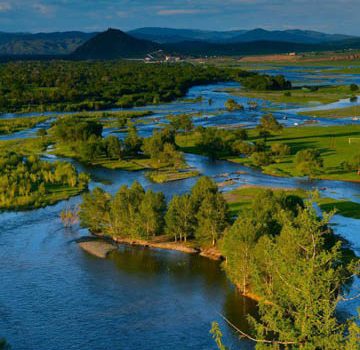Mongolia enjoys more than 260 sunny days per year, which means it’s one of the sunniest countries in the world. In winter, the sky keeps its intense blue colour but combines with biting cold.
Spring
April and May are transitional months. It’s spring. The climate is certainly getting warmer but it’s the sandstorms period: being caught by a storm in Gobi desert can be an unforgettable experience. May is reputed to be the most unsettled month; the four seasons can pass in a single day… From which the Mongolian motto: “beware of the morning sun”.
The reward for the traveller is that spring is the period when the livestock gives birth, which entails a great activity in the countryside (shearing-time). If you want to be alone in the steppes and to live at the pace of nomad (transhumance, birth, combing out, cashmere, this is certainly the best period
Summer and autumn
Then come the four most pleasant months for a trip to Mongolia: June, July, August, and September.
From June, temperatures are higher than 20°C (68°F) and it’s pleasant to visit Mongolia. June and July are the most humid months and showers in the end of the afternoons are frequent, notably in Khovsgol.
June and September are the most favourable months to visit Gobi.
In July, the steppe takes her nice green colour and keeps it for about two months.
From the 15th of August, night temperatures significantly drop with frost risk, but the days remain pleasant with temperatures varying between 15°C and 25°C (59-77°F), and this lasts until mid-September. From mid-September, the forests of larches take the colours of autumn, which gives the country a breath-taking beauty. Weather is still dry and sunny, but temperatures begin to drop. It remains possible to visit Mongolia until the end of October, but think of bringing warm clothes, because temperatures may drop under 0°C (32°F).
Snow risk in altitude from mid-August, and in plains from mid-September.
Winter?
From November to March, temperatures remain negative, with averages fluctuating around -25°C (-13°F) during the coldest months of the year (December and January). Cold remains dry and there is very little snow in that period (besides, snow is a sign of mild spell). If you have fitted equipment, it remains possible to visit Mongolia. A stay among breeder in that period is a magical moment; the reception is as warm as it’s cold outside. In that period, some activities get possible: hunting with falconers, dog sledge, or attending the Ice Festival.






